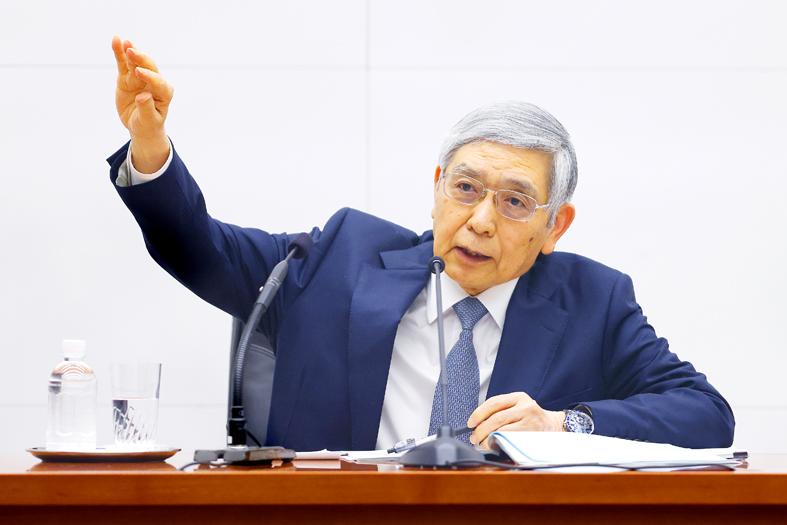The Bank of Japan (BOJ) yesterday indicated increasing concern over the economy as it stuck with a dovish stance that contrasts with the rate hikes of the US Federal Reserve and the Bank of England this week.
The Bank of Japan left its interest rates and asset purchases unchanged, a statement showed, as predicted by all economists surveyed by Bloomberg.
The central bank revised down its economic assessment just two months after it was upgraded, citing the impact of the COVID-19 pandemic.

Photo: Bloomberg
The bank also flagged the need to monitor developments in markets and commodity prices in the wake of Russia’s invasion of Ukraine.
With the decision, the Bank of Japan cemented its outlier status following the rate hikes of its global counterparts this week.
Japan still has little price growth compared with the US or Europe, and its economy is lagging peers in returning to pre-pandemic levels, making its stand-pat decision relatively straightforward this time.
Still, the position for policymakers could get increasingly awkward over the next few months as public angst rises over cost-push inflation driven by rising fuel prices and a weakening yen.
“The BOJ is making it crystal clear that it won’t follow the Fed and other peers in tightening policy,” said Izuru Kato, lead economist at Totan Research. “With little wage growth, it can’t tighten so easily, especially when uncertainties are intensifying due to the war in Ukraine.”
“They are also aware that the meaning of a rate hike in Japan is very different from in the US and Europe because the government has a mountain of public debt,” Kato said.
“Raising rates here would be tantamount to opening Pandora’s box,” he said.
While inflation still remains subdued in Japan, it is picking up speed. Key consumer prices rose 0.6 percent last month, while energy costs climbed at the fastest pace in 41 years, a government report earlier yesterday said.
The growth in prices is expected to accelerate more notably from next month, when the heavy drag from cellphone fee cuts begins to drop out of calculations.
With a further boost from energy prices also expected, an increasing number of economists are warning that inflation could reach 2 percent or breach it this year.
That might put consumers off spending and deepen public discontent at a time of limited wages growth, while also raising questions about the Bank of Japan’s continued stimulus to generate inflation.
The bank acknowledged the trend of rising prices by tweaking its wording on the outlook for inflation, saying it is expected to “clearly” rise and citing energy prices as a key driver.
While developments in the war are likely to keep markets volatile, it is far from clear how long the situation will last and whether it will feed a longer-term trend, said economist Harumi Taguchi at S&P Global Market Intelligence.
“The BOJ is focused fundamentally on whether a broad range of products see price hikes as a result of companies passing on costs, and whether wages start rising,” Taguchi said. “For the BOJ, their stance is still ‘wait and see’ and that’s why they’re sticking to their position that it’s too early to change policy.”
The central bank’s concern over the economy comes with a majority of private economists expecting another contraction this quarter, mainly due to fallout from the Omicron variant of SARS-CoV-2 that struck earlier in the year.

Sweeping policy changes under US Secretary of Health and Human Services Robert F. Kennedy Jr are having a chilling effect on vaccine makers as anti-vaccine rhetoric has turned into concrete changes in inoculation schedules and recommendations, investors and executives said. The administration of US President Donald Trump has in the past year upended vaccine recommendations, with the country last month ending its longstanding guidance that all children receive inoculations against flu, hepatitis A and other diseases. The unprecedented changes have led to diminished vaccine usage, hurt the investment case for some biotechs, and created a drag that would likely dent revenues and

Global semiconductor stocks advanced yesterday, as comments by Nvidia Corp chief executive officer Jensen Huang (黃仁勳) at Davos, Switzerland, helped reinforce investor enthusiasm for artificial intelligence (AI). Samsung Electronics Co gained as much as 5 percent to an all-time high, helping drive South Korea’s benchmark KOSPI above 5,000 for the first time. That came after the Philadelphia Semiconductor Index rose more than 3 percent to a fresh record on Wednesday, with a boost from Nvidia. The gains came amid broad risk-on trade after US President Donald Trump withdrew his threat of tariffs on some European nations over backing for Greenland. Huang further

Nvidia Corp’s GB300 platform is expected to account for 70 to 80 percent of global artificial intelligence (AI) server rack shipments this year, while adoption of its next-generation Vera Rubin 200 platform is to gradually gain momentum after the third quarter of the year, TrendForce Corp (集邦科技) said. Servers based on Nvidia’s GB300 chips entered mass production last quarter and they are expected to become the mainstay models for Taiwanese server manufacturers this year, Trendforce analyst Frank Kung (龔明德) said in an interview. This year is expected to be a breakout year for AI servers based on a variety of chips, as

HSBC Bank Taiwan Ltd (匯豐台灣商銀) and the Taiwan High Prosecutors Office recently signed a memorandum of understanding (MOU) to enhance cooperation on the suspicious transaction analysis mechanism. This landmark agreement makes HSBC the first foreign bank in Taiwan to establish such a partnership with the High Prosecutors Office, underscoring its commitment to active anti-fraud initiatives, financial inclusion, and the “Treating Customers Fairly” principle. Through this deep public-private collaboration, both parties aim to co-create a secure financial ecosystem via early warning detection and precise fraud prevention technologies. At the signing ceremony, HSBC Taiwan CEO and head of banking Adam Chen (陳志堅)